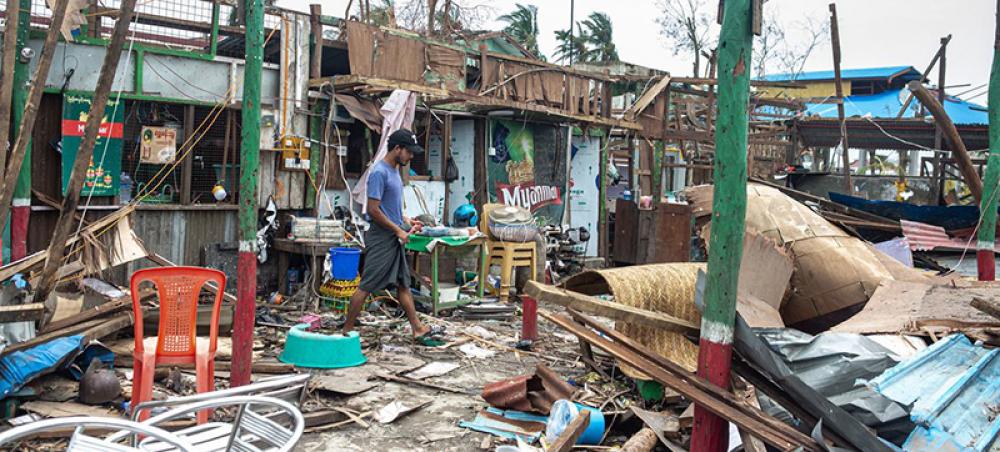Just Earth News | @justearthnews | 03 Jun 2023

Image: UNICEF/Naing Lin Soe
New York: More than two weeks after deadly Cyclone Mocha hit Myanmar, aid access is uncertain, disease is spreading, and a major food crisis remains a very real threat, the UN said on Friday.
Some 1.6 million people in Rakhine, Chin, Magway, Sagaing, and Kachin states are in dire need of assistance after Mocha’s 250 kilometre per hour wind gusts destroyed homes, farmland and livestock.
Tweet URL
Speaking from hard-hit Rakhine State capital Sittwe, UN Development Programme (UNDP) Resident Representative in Myanmar, Titon Mitra, said that time was of the essence as food reserves were being “completely wiped out”, water sources needed to be urgently decontaminated and the monsoon was just “a matter of weeks away”.
Dire need for access
“The international community has to be given widespread access to the affected communities. And that's a very urgent requirement,” he said.
Last month, the UN launched a $333 million Flash Appeal for Myanmar. While some assistance is coming through, Mr. Mitra said that it was “not anywhere near sufficient” for the time being due to a lack of access and support in rural areas remained “far from adequate”.
“Some regional donors have already provided some support and that's been channelled through the military logistics as CSOs (civil society organizations) and UN organizations have got limited access at the moment,” Mr. Mitra said.
'Depoliticization, demilitarization’ of aid
The UN official highlighted that a distribution plan has been submitted to the military authorities, stressing that “it needs to be cleared very soon, so international organizations with their CSO partners can move freely”.
More than two years since Myanmar’s generals staged a military coup, sparking widespread ongoing civil unrest and violence, Mr. Mitra insisted that “this really is a time for the depoliticization and the demilitarization of aid, because the needs are absolutely immense”.
Rural livelihoods in jeopardy
The recovery may take years, he added, pointing out that the majority of those affected were already “the poorest of the poor”.
Concerns are also mounting fast about the future of rural livelihoods, as some 1,200 square kilometres of land flooded due to Mocha, while rains combined with storm surges devastated agriculture and fisheries.
Looming food security crisis
Mr. Mitra warned that the provision of relief itself was “not enough” and that if people are unable to plant food crops within the next few weeks, there could be a “major food crisis” emerging in the coming months.
“Households have completely lost their seed stocks. So we are anticipating, unless there's an effective response, that food availability and affordability will become huge issues,” he insisted.
Earlier this week, the UN included Myanmar in a list of 18 “hunger hotspots” where critical food insecurity is projected to intensify.
‘Cycle of suffering’
Already before Mocha hit, 80 per cent of people in Rakhine were living in poverty and 200,000 were internally displaced. In 2022, half of the state’s population were cutting down on meals due to the economic crisis, according to UNDP data.
If swift action by the international community did not materialize, “we risk perpetuating an unending cycle of suffering”, Mr. Mitra warned.